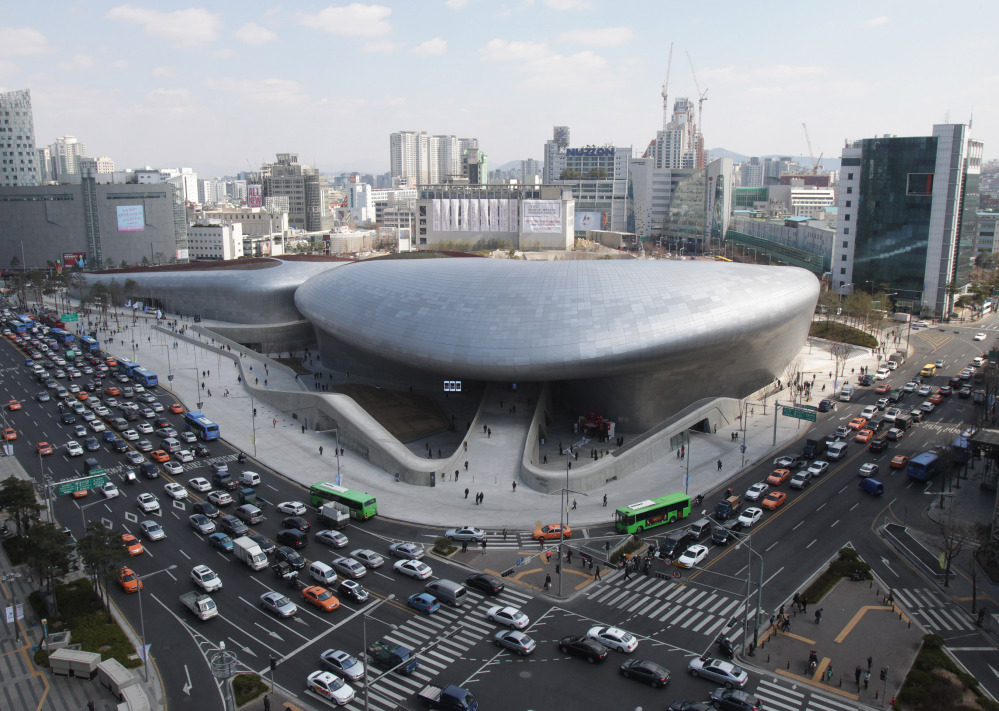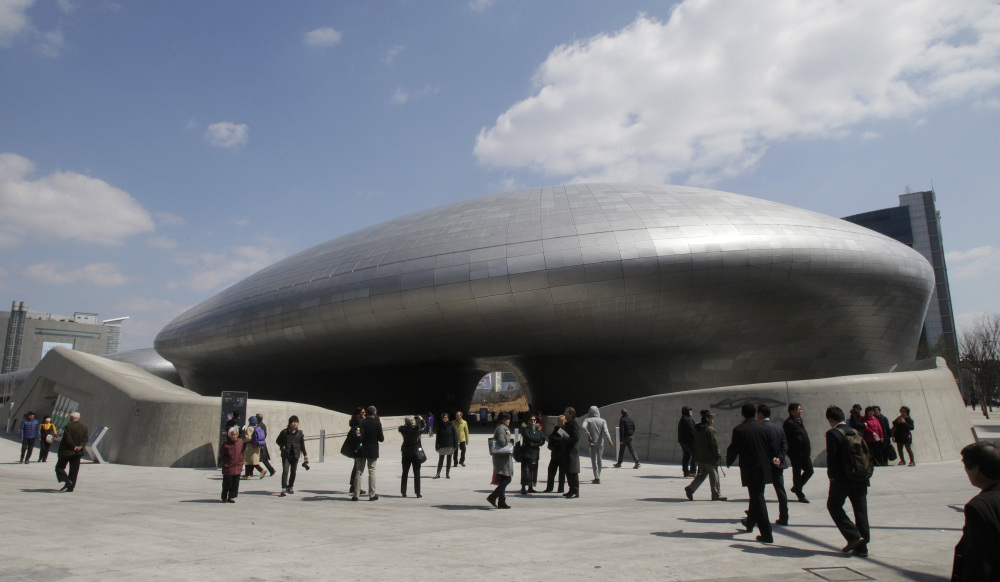SEOUL, South Korea — A curvy futuristic $450 million building meant to remake Seoul into a global design capital opened to the South Korean public Friday after years of debate about its impact on a historic city precinct. And not everyone is happy with the outcome.
Designed by award-winning architect Zaha Hadid, the Dongdaemun Design Plaza is a stark contrast to its neighborhood, which is better known in Seoul for its links to a royal dynasty that ruled for half a millennium and as home to one of the city’s oldest markets.
Located in central Seoul, the Dongdaemun area bustles with shoppers and vendors day and night, selling trendy clothes at budget prices, textiles and a bewildering array of knick-knacks. It lacks the glitz and glamor of Seoul’s trendy Gangnam district, made world famous by the rapper Psy’s “Gangnam Style” hit. But locals and tourists alike find charm in Dongdaemun’s lively stores and nearby vintage markets, scenes recalling an older Seoul that is quickly disappearing.
Hadid’s signature flowing curves impart a sense of calm to the imposing steel structure that along with a plaza occupies 15.6 acres. At night, the edifice is illuminated with soft LED lights in contrast to the garish neon signs in the neighborhood.
The building is a legacy of the mayoralty of Oh Se-hoon, who opposed welfare and pushed landmark construction projects to redesign Seoul and boost its economy. It cost about 2.4 percent of the city’s annual budget, putting it among the most expensive architectural endeavors ever commissioned by Seoul.
Oh resigned as mayor in 2011, but the Plaza is set to remain a source of debate for years to come.
Some called it an ugly spaceship that made an emergency landing while others praised its architectural accomplishment, using few columns and 45,000 tiles to cover its surface.
As part of the official launch, Dongdaemun Design Plaza is hosting the six-day Seoul Fashion Week and eight art exhibitions. Yet the city is still figuring out how to fill the multi-level building which has a larger floor area than the Louvre’s exhibition space.
Its first test is to cover estimated annual operating costs of 32 billion won ($30 million). Seoul Mayor Park Won-soon said the Plaza will host conferences, concerts, exhibitions and design-related businesses.
Some in Seoul question whether compromises they felt forced to make were worth it. Sports officials and baseball fans opposed demolishing an 80-year-old sports stadium to give way to the sleek building.
The stadium was Korea’s first and sole modern sports stadium until the 1980s, hosting popular high-school baseball matches and the first games of Korea’s professional baseball and football leagues.
“DDP is a beautiful work of architecture,” said Kim Eun-sik, a 40-year-old writer who used to attend baseball games in Dongdaemun and explored the neighborhood’s alleys as a teenager. “But I feel sad and empty as it replaces something that was endearing and joyful to me,” said Kim. “It does not seem like the sacrifice has produced something valuable.”
About 900 merchants who had to relocate their shops and carts to another area hoped the Plaza would boost visitors as the city had promised, said Park No-keum, head of the merchants association. He said they moved out during economic good times when their businesses were at a peak.
Some of the anger about the Plaza was heaped on Hadid, a superstar architect who is behind the design of the main stadium for the 2020 Tokyo Olympics and the first female winner of the prestigious Pritzker Architecture Prize. It was also derided as a product of South Korean insecurity.
Commissioning Hadid is “like having a handbag from Hermes,” said Daniel Tudor, author of “Korea: The Impossible Country,” referencing the popularity of luxury bags as a status symbol in South Korea. Many Koreans think “if we have a certain GDP, nice shiny buildings, then we can show foreigners that we became a developed country,” he said.
Dongdaemun Design Plaza is also an embarrassing reminder how South Korea favored something fancy and new over its cultural heritage, said Pai Hyungmin, an architecture professor at University of Seoul.
He regrets that Seoul moved historic ruins discovered during construction. The Joseon Dynasty that ruled the Korean peninsula from 1392 to 1897 trained its elite troops at Dongdaemun.
Send questions/comments to the editors.




Comments are no longer available on this story